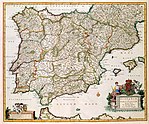 Global Information
Global InformationHistory of Spain information
| History of Spain |
|---|
 |
| Timeline |
|
The history of Spain dates to contact between the pre-Roman peoples of the Mediterranean coast of the Iberian Peninsula made with the Greeks and Phoenicians. During Classical Antiquity, the peninsula was the site of multiple successive colonizations of Greeks, Carthaginians, and Romans. Native peoples of the peninsula, such as the Tartessos people, intermingled with the colonizers to create a uniquely Iberian culture. The Romans referred to the entire peninsula as Hispania, from which the name "Spain" originates. As was the rest of the Western Roman Empire, Spain was subject to the numerous invasions of Germanic tribes during the 4th and 5th centuries AD, resulting in the end of Roman rule and the establishment of Germanic kingdoms, marking the beginning of the Middle Ages in Spain.
Germanic control lasted about 200 years until the Umayyad conquest of Hispania began in 711. The region became known as Al-Andalus, and except for the small Kingdom of Asturias, the region remained under the control of Muslim-led states for much of the Early Middle Ages, a period known as the Islamic Golden Age. By the time of the High Middle Ages, Christians from the north gradually expanded their control over Iberia, a period known as the Reconquista. As they expanded southward, a number of Christian kingdoms were formed, including the Kingdom of Navarre, the Kingdom of León, the Kingdom of Castile, and the Kingdom of Aragon. They eventually consolidated into two roughly equivalent polities, the Crown of Castile and the Crown of Aragon. The early modern period is generally dated from the union of the Crowns of Castile and Aragon in 1469.
The marriage and joint rule of Isabella I and Ferdinand II is historiographically considered the foundation of a unified Spain. The conquest of Granada, and the first voyage of Columbus, both in 1492, made that year a critical inflection point in Spanish history. The voyages of the various explorers and conquistadors of Spain during the subsequent decades helped establish a Spanish colonial empire which was among the largest ever. King Charles I established the Spanish Habsburg dynasty. Under his son Philip II the Spanish Golden Age flourished, the Spanish Empire reached its territorial and economic peak, and his palace at El Escorial became the center of artistic flourishing. However, Philip's rule also saw the calamitous destruction of the Spanish Armada, numerous state bankruptcies and the independence of the Northern Netherlands, which marked the beginning of the slow decline of Spanish influence in Europe. Spain's power was further tested by its participation in the Eighty Years' War, whereby it tried and failed to recapture the newly independent Dutch Republic, and the Thirty Years' War, which resulted in continued decline of Habsburg power in favor of the French Bourbon dynasty. Matters came to a head during the reign of Charles II of Spain, whose mental incapacity and inability to father children left the future of Spain in doubt. Upon his death, the War of the Spanish Succession broke out between the French Bourbons and the Austrian Habsburgs over the right to succeed Charles II. The Bourbons prevailed, resulting in the ascension of Philip V of Spain, who took Spain into the various wars to recapture the Spanish-controlled lands in Southern Italy recently lost.
Spain's apparent resurgence was cut short by losses during the Napoleonic era, when Spain became a French puppet state. Concurrent with, and following, the Napoleonic period the Spanish American wars of independence resulted in the loss of most of Spain's territory in the Americas. During the re-establishment of the Bourbon rule in Spain, constitutional monarchy was introduced in 1813. As with much of Europe, Spain's history during the nineteenth century was tumultuous, and featured alternating periods of republican-liberal and monarchical rule. The Spanish–American War led to losses of Spanish colonial possessions and a series of military dictatorships, during which King Alfonso XIII was deposed and a new Republican government was formed. Ultimately, the political disorder within Spain led to a coup by the military which led to the Spanish Civil War. After much foreign intervention on both sides, the Nationalists emerged victorious; Francisco Franco led a fascist dictatorship for almost four decades. Franco's death ushered in a return of the monarchy under King Juan Carlos I, which saw a liberalization of Spanish society and a re-engagement with the international community after the oppressive and isolated years under Franco. A new liberal Constitution was established in 1978. Spain entered the European Economic Community in 1986 (transformed into the European Union in 1992), and the Eurozone in 1998. Juan Carlos abdicated in 2014, and was succeeded by his son Felipe VI.